Seat Leon >> Removing and installing rain and light sensor
Removing and installing rain and light sensor - G397- , vehicles with front camera for driver assist systems
Note
- The rain and light sensor has a silicon layer (coupling pad) which forms the contact surface to the windscreen.
- The rain and light sensor has been designed so that it can be used again. A prerequisite for re-use is that the coupling pad is not damaged or dirty (check!).
Removing
- Switch off ignition and all electrical consumers.
Vehicles without access and start authorisation system
- Remove ignition key, if fitted.
Vehicles with access and start authorisation system
- Store the ignition key outside the vehicle to prevent the ignition from being switched on unintentionally.
Continued for all vehicles
- Cover -1- of the front camera support is pushed downward -Arrow A- unclip and remove -Arrow A-
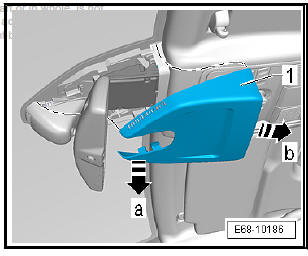
Note Wait at least 1 minute after releasing the retaining clip. This is necessary to ensure that the silicone coating is relieved of tension and will not be damaged during removal.
- Release retaining clip on left and right -arrows-.
- Carefully lever out rain and light sensor - G397- -1- from retaining frame on windscreen, starting from the top.
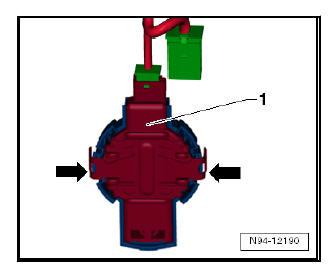
- Release and pull off connector -1- and remove rain and light sensor - G397- -2-.
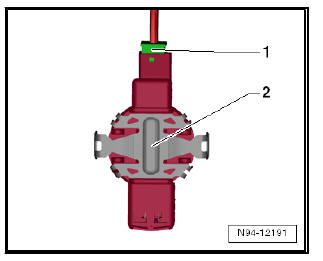
| Caution Until the time comes to reinstall it, store removed rain and light sensor - G397- in a place where the coupling pad cannot be damaged or soiled from dust, etc. |
Installing
Installation is carried out in the reverse sequence; note the following:
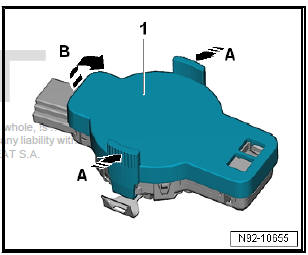
Caution
|
Note If the surface of the coupling pad on the rain and light sensor - G397- is soiled, it may be possible to clean it by "sticking on" and then "pulling off" one or more adhesive strips.
- Clean windscreen within retaining plate thoroughly.
- If necessary, remove protective cap -1- from new rain and light sensor - G397- .
- Press grip in direction of arrow -A-.
- Remove protective cap -1- in direction of arrow -B-.
- Reconnect connector.
- Insert rain and light sensor - G397- -1- into retaining frame on windscreen.
- Push retaining clip on both sides -arrows- so that it can be heard to engage.
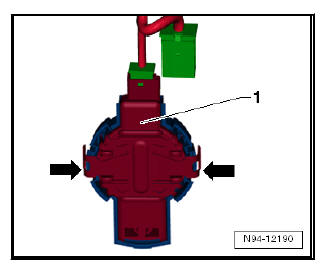
Note
- Even when sensor is installed correctly, small air bubbles may first appear between windscreen and coupling pad. After approx. 10 minutes, the contact surface must be free of bubbles.
- If the contact surface is not free of bubbles after 10 minutes, the rain and light sensor - G397- must be removed and installed anew.
- Air bubbles between the windscreen and coupling pad can lead to malfunctions in the rain and light sensor - G397- .
- If rain and light sensor - G397- was replaced, perform coding.
Code the rain and light sensor - G397-
- Connect vehicle diagnostic tester.
- Coding rain and light sensor - G397-.
Removing and installing rain and light sensor - G397- , vehicles without front camera for driver assist systems
Note
- The rain and light sensor has a silicon layer (coupling pad) which forms the contact surface to the windscreen.
- The rain and light sensor has been designed so that it can be used again. A prerequisite for re-use is that the coupling pad is not damaged or dirty (check!).
Removing
- Switch off ignition and all electrical consumers.
Vehicles without access and start authorisation system
- Remove ignition key, if fitted.
Vehicles with access and start authorisation system
- Store the ignition key outside the vehicle to prevent the ignition from being switched on unintentionally.
Continued for all vehicles
- Remove centre console.
Note Wait at least 1 minute after releasing the retaining clip. This is necessary to ensure that the silicone coating is relieved of tension and will not be damaged during removal.
- Release retaining clip on left and right -arrows-.
- Carefully lever out rain and light sensor - G397- -1- from retaining frame on windscreen, starting from the top.
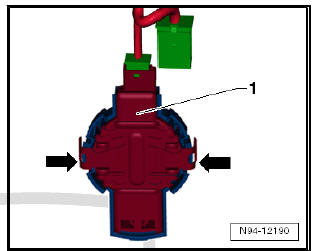
- Release and pull off connector -1- and remove rain and light sensor - G397- -2-.
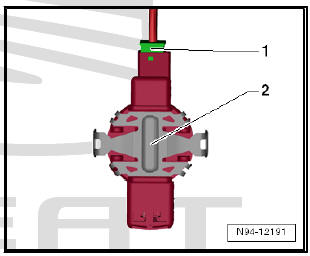
| Caution Until the time comes to reinstall it, store removed rain and light sensor - G397- in a place where the coupling pad cannot be damaged or soiled from dust, etc. |
Installing
Installation is carried out in the reverse sequence; note the following:
Caution
|
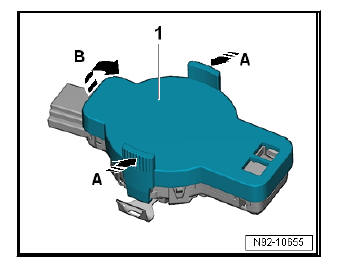
Note If the surface of the coupling pad on the rain and light sensor - G397- is soiled, it may be possible to clean it by "sticking on" and then "pulling off" one or more adhesive strips.
- Clean windscreen within retaining plate thoroughly.
- If necessary, remove protective cap -1- from new rain and light sensor - G397- .
- Press grip in direction of arrow -A-.
- Remove protective cap -1- in direction of arrow -B-.
- Reconnect connector.
- Insert rain and light sensor - G397- -1- into retaining frame on windscreen.
- Push retaining clip on both sides -arrows- so that it can be heard to engage.
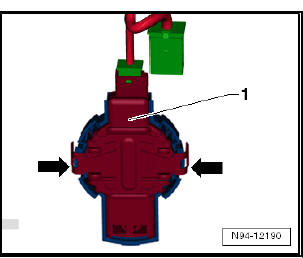
Note
- Even when sensor is installed correctly, small air bubbles may first appear between windscreen and coupling pad. After approx. 10 minutes, the contact surface must be free of bubbles.
- If the contact surface is not free of bubbles after 10 minutes, the rain and light sensor - G397- must be removed and installed anew.
- Air bubbles between the windscreen and coupling pad can lead to malfunctions in the rain and light sensor - G397- .
- If rain and light sensor - G397- was replaced, perform coding.
Code the rain and light sensor - G397-
- Connect vehicle diagnostic tester .
- Coding rain and light sensor - G397- .
Repairing rain and light sensor - G397- , TRW
There are different housings depending on the make of rain sensor.
The rain sensor housing with lens unit is always supplied as a replacement in individual parts with retaining clips. On vehicles for which these retaining clips are not required, the clips must be removed.
Carry out the following work:
- Remove rain sensor
| Caution The rain sensor electronics could become damaged.
|
- Release 4 locking lugs -arrows- of retaining clip -1- using a suitable screwdriver, and remove retaining clip.
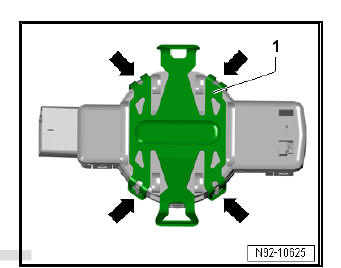
- Separate upper part of housing -1- together with lens unit from bottom part of housing -2- by releasing retaining lugs -arrows- on both sides.
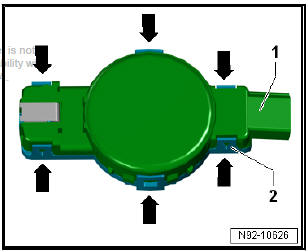
| Caution The lens unit of the rain and light sensor may become damaged.
|
- Remove rain and light sensor electronics -2- from upper part of old housing -1- and insert into new upper part of new housing in exactly same way.
- Engage upper part of housing with lens unit and protective cover with lower part of housing.
- Install rain sensor.
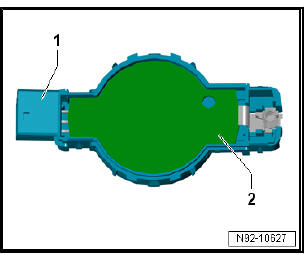
Repairing rain and light sensor - G397- , Valeo
- Remove rain and light sensor - G397- .
- Carefully remove sensor foil -2- or any sensor foil residues from rain and light sensor - G397- -1-.
| Caution The surfaces of the sensor must be completely free of remnants of foil. |
- Clean sensor surfaces with cleaning solution D 009 401 04.
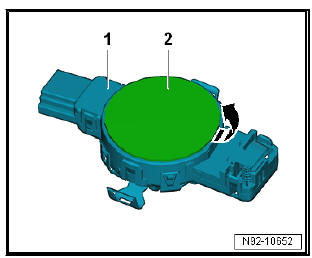
- Pull silicone paper -3- off sensor foil -2-.
The transparent protective foil -1- remains initially on sensor foil as an assembly aid.
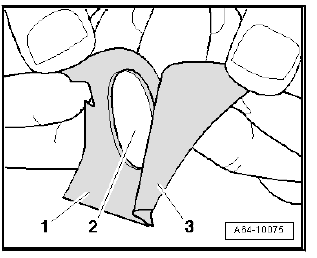
- Place sensor foil on rain and light sensor -2- with aid of transparent protective film -1-.
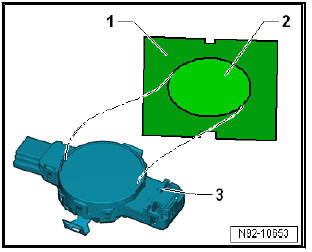
- Press sensor foil through protective film -1- onto rain and light sensor -2- making sure there are no air bubbles.
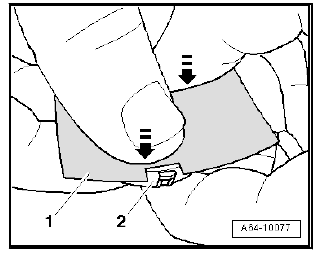
- Peel transparent protective film -1- off sensor foil -2-.
- Install rain sensor.
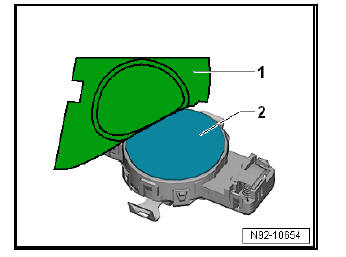
 Removing and installing windscreen
wiper motor V
Removing and installing windscreen
wiper motor V
Removing
Remove wiper arms.
Remove bolts -1, 3, 5-.
Take wiper frame -2- with linkage and wiper motor out of plenum
chamber.
Unplug the electrical connector -4-.
Installing
Installatio ...
See also:
Content
This manual is structured to give you the information you need as quickly and
clearly as possible. The contents of this Manual are grouped into relatively
short sections making up chapters (e.g. “ ...

